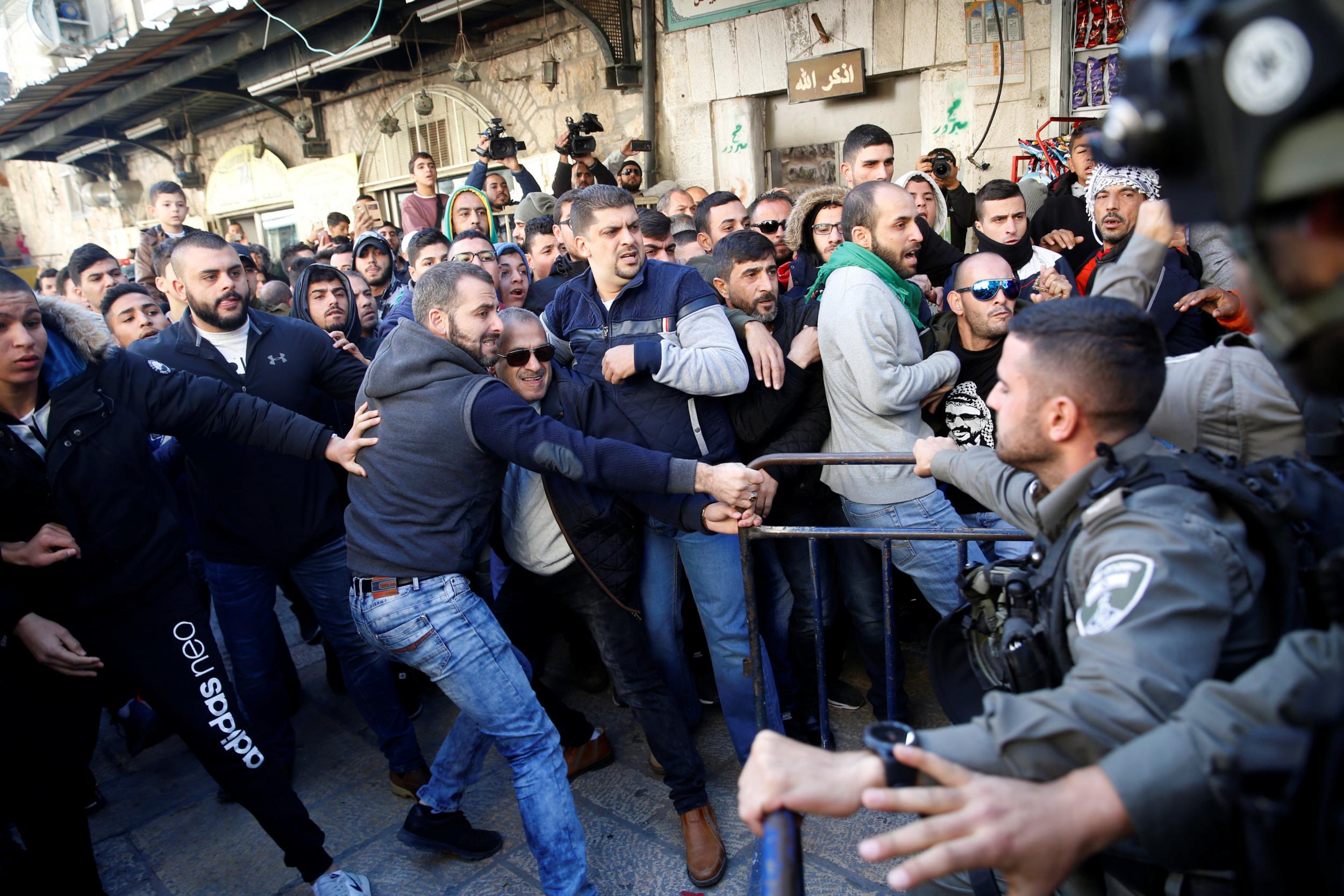Jerusalem protests latest: Two Palestinians 'killed by Israeli fire' in clashes on 'Day of Rage'
Palestinians report two deaths in 'day of rage' protests triggered by US decision to recognise divided city of Jerusalem as Israel's capital

Your support helps us to tell the story
This election is still a dead heat, according to most polls. In a fight with such wafer-thin margins, we need reporters on the ground talking to the people Trump and Harris are courting. Your support allows us to keep sending journalists to the story.
The Independent is trusted by 27 million Americans from across the entire political spectrum every month. Unlike many other quality news outlets, we choose not to lock you out of our reporting and analysis with paywalls. But quality journalism must still be paid for.
Help us keep bring these critical stories to light. Your support makes all the difference.
Two Palestinians have been killed in clashes over US recognition of Jerusalem as Israel’s capital, after Hamas called for a “Day of Rage” in protest against Donald Trump’s decision.
Israeli soldiers shot the two men dead on Friday near the Gaza border, the Palestinian Health Ministry said in a statement, while the Red Cross said scores were wounded in clashes across the West Bank.
The Israeli military said hundreds of Palestinians had rolled burning tyres and thrown rocks at soldiers across the Gaza border.
“During the riots Israel Defence Forces (IDF) soldiers fired selectively towards two main instigators and hits were confirmed,” an army statement said.
The Trump administration’s move to recognise Jerusalem as Israel’s capital has angered Palestinians, sparking protests that stretched across the Muslim world on Friday, from Turkey to Indonesia.
Speaking at the UN Security Council in New York, the UN Middle East envoy Nickolay Mladenov warned there was a risk of violent escalation after Mr Trump’s speech on Wednesday.
“There is a serious risk today that we may see a chain of unilateral actions, which can only push us further away from achieving our shared goal of peace,” he said.
Various Palestinian groups, including militant organisation Hamas, had called for the protests to take place against the US and in opposition to the Israeli occupation.
An estimated 3,000 people marched, burned Israeli flags and stamped on posters of Mr Trump in around 30 protests across the Palestinian territories.
In Jerusalem itself, midday prayers ended with marches through the Old City. While there was some pushing and shoving as police broke up the crowds, the protests remained largely peaceful.
Protesters chanted “Jerusalem is ours”, “We don’t need empty words, we need stones and Kalashnikovs” and “America is the head of the snake”, as Friday prayers ended and worshippers made their way from the al-Aqsa mosque to the walled Old City gates.
In Hebron, Bethlehem and Nablus, dozens of Palestinians threw stones at Israeli soldiers who fired back with tear gas.
At least 13 people were injured by live fire and 47 by rubber bullets across the West Bank and Gaza throughout the day. Dozens more suffered from tear gas inhalation, Red Crescent paramedics said.
Six arrests were made, the IDF said.
In Gaza, protests were accompanied by loudspeakers blaring messages from Hamas’s leaders.
“Whoever moves his embassy to occupied Jerusalem will become an enemy of the Palestinians and a target of Palestinian factions,” said leader Fathi Hammad.
“We declare an intifada until the liberation of Jerusalem and all of Palestine.”
On Thursday, the militant organisation had called on the Palestinian people to rise up in a new intifada, a separate rallying cry than those for three days of Palestinian rage.
An intifada cannot be called or commanded by Palestinian leaders. While both Fatah and Hamas encouraged the two previous uprisings, the movements grew out of grassroots mass Palestinian support.
It is too early yet to tell whether protesters will take up Hamas’s call. Observers remain hopeful the relatively low levels of violence seen so far means the situation will remain calm.
Israel annexed east Jerusalem in the 1967 Six Day war, a move that was regarded as illegal by the international community. Both Israelis and Palestinians claim the holy city as their undivided capital.
Mr Trump’s announcement on Wednesday upended decades of existing US policy, which is currently that the status of Jerusalem will be decided at an advanced level of peace talks.
While welcomed by Israeli Prime Minister Benjamin Netanyahu, many other world leaders have expressed concern that the controversial move could spark renewed violence in the region and wider Muslim world.
US Secretary of State Rex Tillerson said on Friday it would still be up to the Israelis and Palestinians to hammer out all other issues surrounding the city in future talks.
“With respect to the rest of Jerusalem, the President... did not indicate any final status for Jerusalem,” he said from Paris.
“[Mr Trump] was very clear that the final status, including the borders, would be left to the two parties to negotiate and decide.”
And in New York, the US ambassador to the UN, Nikki Haley, insisted the US could maintain its status as a mediator in the crisis, despite this week’s violent backlash.
“The United States has credibility with both sides. Israel will never be, and should never be, bullied into an agreement by the United Nations, or by any collection of countries that have proven their disregard for Israel’s security,” Ms Haley said. She said it was the UN, rather than the US, that had damaged the prospects of Middle East peace.
Subscribe to Independent Premium to bookmark this article
Want to bookmark your favourite articles and stories to read or reference later? Start your Independent Premium subscription today.
Join our commenting forum
Join thought-provoking conversations, follow other Independent readers and see their replies
Comments